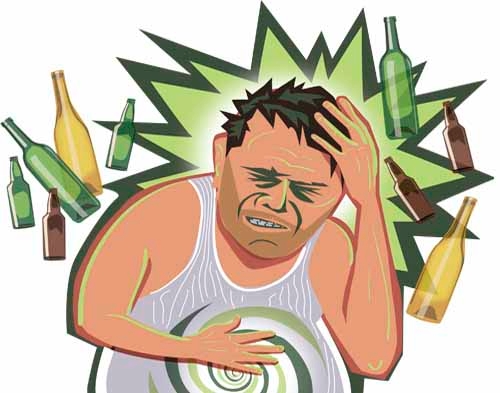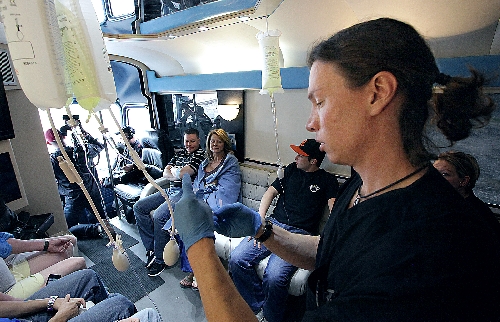Hangovers follow heavy drinking like sunrises follow nights of revelry



If you believe men are caring individuals, who want more than anything else to understand what women have to go through in pregnancy, then you believe that they get drunk and suffer hangovers from too much New Year’s Eve partying only so they can appreciate how difficult morning sickness can be.
Yes, you believe that they endure nausea, headaches, feeling fatigued and shaky, perhaps even feeling the sensation of swollen breasts (from passing out face-down on the floor), simply to better understand a woman early with child.
Of course, if you believe this, you probably are a woman who’s already had far too much to drink, a hopeless romantic whose dreams of being impregnated by the love of your life on New Year’s Day will sadly end as your own head-pounding hangover forces you to slap your man’s pawing hands away.
Ah, hangovers, nature’s way of telling you that you had too much to drink. Even Shakespeare’s writing suffered because of them. Dominic Dromgoole, artistic director of the Globe Theatre and author of "Will and Me," says Wild Will’s plays contain several passages of poor, turgid writing, which he attributes to the playwright’s hangovers in the mornings.
Could it be that —- "O Romeo, Romeo, wherefore art thou, Romeo?" —- would have been the more hip —- "Hey, Romeo, why oh why are ya who you are, baby?" —- if he hadn’t had gastrointestinal distress from too many whiskey sours the night before?
To be or not to be hung over? That, of course, is a question man has asked since the beginning of time. Think of how often vomiting dudes being chased around by dinosaurs must have wished they hadn’t stopped at the cave for one more brew.
Even if you’re a teetotaler and wouldn’t drink alcohol at gunpoint, you still get a sense of a hangover’s effect if you read Isaiah 5:11 in the Bible: "Woe unto them that rise up early in the morning, that they may follow strong drink."
The advice from the bloodletting doctors of yesterday and the pill prescribing physicians of today is essentially the same when it comes to the best way to prevent hangovers: If you don’t drink too much booze, you can’t lose. Abstinence is best.
But, alas, that good advice is too often received with the same disdain as a no smoking sign at a national convention of smoke-shop owners. Fortunately, it appears fewer people are ignoring "don’t drink and drive" advice, either getting buzzed at home or using designated drivers. Fatalities involving drunken drivers are down 53 percent since first measured in 1982 .
Even one death from what was supposed to be a heightened good time is too many.
"Too many people overindulge," says Dr. Mitchell Forman, dean of the Touro College of Osteopathic Medicine in Henderson. "Moderation is the key. You need to know your own health, reduce and limit the amount you drink."
Scientists still aren’t precisely sure what causes hangovers, partly because it’s difficult to hold clinical trials that would repeatedly ask subjects to, in effect, deliberately engage in behavior that results in feeling like death warmed over.
But what they do know is that alcohol dehydrates, blocking hormones that normally would keep you from continually racing to the bathroom. Each drink you down makes you lose more water than you take in, causing a multitude of problems, including a blistering headache.
As your body breaks down alcohol, it pumps out lactic acid and other byproducts that impede the production of glucose, or sugar, as well as electrolytes —- the salts and other minerals which keep your body functioning properly. That’s why the hopelessly hung over complain of feeling weak and woozy.
Too much booze also irritates your gastrointestinal tract —- it’s kind of like intermittently pouring a martini on an open cut in the palm of your hand.
Some people are genetically more susceptible to hangovers. People of Asian descent and women, for example, generally have lower levels of alcohol dehydrogenase, an enzyme that breaks down alcohol.
Some drinks wreck you more than others: Colorless alcohols such as vodka and gin are kinder on the body than dark whiskey or even red wine. More good news about vodka and gin —- should you throw up on the carpet, their stains are easier to remove.
Given that people don’t want to feel like hell for long after a night of what amounts to binge drinking —- doctors define that as five drinks or more in a night or more than three drinks in one to two hours —- it isn’t surprising that a long list of "cures," some far more mythical than medicinal, has sprung up.
None carries more mythology than "hair of the dog," an expression first used to describe the goofy treatment of a rabid dog bite by placing hair from the dog in the bite wound. Makes you wonder whether the doctor who came up with that procedure took more than a nip now and then. Anyway, as a metaphor for hangover treatment, "hair of the dog" showed up in the Dictionary of Phrase and Fable in 1898 in a section written by Ebenezer Cobham Brewer: "In Scotland it is a popular belief that a few hairs of the dog that bit you applied to the wound will prevent evil consequences. Applied to drinks, it means, if overnight you have indulged too freely, take a glass of the same wine within 24 hours to soothe the nerves."
Well, Dr. Dale Carrison, chief of staff at University Medical Center, says "hair of the dog" won’t stop you from experiencing the delirium and sure death from rabies nor will it stop you from feeling like you’re going to die from a hangover.
What drinking in the morning after a night of drinking will do, he said, is dull the senses for a while, just prolonging the agony to come. It’s akin to drinking a triple shot of Wild Turkey bourbon as a "remedy" for dropping a brick on your bare big toe.
Another popular myth is taking Tylenol or some other form of acetaminophen before you go to bed after a night of heavy drinking. While it won’t kill the effects of the booze, it can go a long way toward killing your liver.
"That can be very dangerous," Carrison says, noting that the practice can inflame the liver and do permanent damage.
Now that we’re more obese than ever, it only stands to reason that the health conscious obese would argue that drinks with fewer calories are a healthier choice. Unfortunately, studies done in Australia show that diet cocktails make people more drunk. Why? The fewer calories in the drink, the more quickly it empties from your tummy, so more alcohol actually makes it through to your bloodstream.
Scientists say it’s well past time to get this straight: Eating before bed doesn’t mute a hangover, that’s a myth. But eating before you drink can. If you’re busy digesting meatloaf, your bourbon on the rocks will be delivered to your bloodstream more slowly, giving it less chance to build to head-splitting levels.
Though people think wine is easier on you the next day, beer actually is. Compounds in wine, including tannins, can trigger bad headaches in some people, Carrison says.
How this myth ever got backing —- if you drink through a straw you get trashed faster —- is testimony to how drunks believe anything that’s said. Unless you can suck faster than you gulp, Carrison notes, there’s no truth to it.
Of course, if you live in Las Vegas, you can do what more and more hung- over tourists are doing —- stumbling aboard the Hangover Heaven bus on the Strip.
The brainchild of Dr. Jason Burke, a board-certified anesthesiologist who trained at prestigious Duke University, Hangover Heaven gives you the opportunity to receive, through an IV, a blend of fluids containing electrolytes and other solutions to cure dehydration, as well as the anti-nausea drug Ondansetron and the anti-inflammatory drug Ketorolac.
Prices range from $90 to $200, with the highest price coming for treatment that includes an IV vitamin mix.
Burke, who opened the practice earlier this year, takes a full medical history of each patient.
Some people with, say, severe kidney disease, could be at risk with the treatments, he said.
"I have to send them on their way," he said.
Still, he said, most people who drop in for the therapy feel much better in just 45 minutes.
"I’ve saved a lot of vacations," he said. "And I’m helping the economy here in Las Vegas. I get people out spending money again instead of them staying in their rooms (with hangovers)."
So it goes in Las Vegas —- where a brilliant physician who trained at one of the world’s finest medical schools works tirelessly to ensure that the hungover live to drink another day.
Contact reporter Paul Harasim at pharasim@reviewjournal.com or 702-387-2908.
Averting a HangoverSo how do you lessen the chances of painful hangover? Drs. Mitchell Forman and Dale Carrison agree on nine steps.
• Drink plenty of water before you party to stay hydrated and to dilute the booze you’ll be drinking.
• Eat steak, sausage or pizza before partying to slow your body’s absorption of alcohol.
• Drink a glass of water between each alcoholic drink to dilute the alcohol in your body.
• Choose beer and clear liquors over whiskey and red wine, which tend to produce headaches.
• If you need some pain relief, use aspirin or ibuprofen.
• Drink plenty of water and electrolyte-replenishing sports drinks such as Gatorade.
• Eat bland foods such as toast and crackers to boost your blood sugar.
• Make a bacon sandwich — the bread will raise your blood sugar and the protein in the bacon breaks down to amino acids to help replenish brain neurotransmitters smothered by the alcohol.
• Soups that restore salt and potassium stolen by alcohol also ease hangover pain.


















